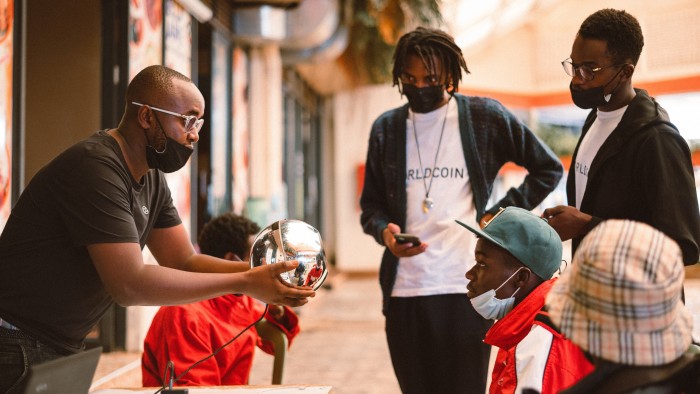Stay informed with free updates
Simply sign up to the Artificial intelligence myFT Digest — delivered directly to your inbox.
Sam Altman’s eyeball-scanning digital ID project is being rolled out in the UK, giving Britons access to verification services that the entrepreneur claims are essential for distinguishing between human and artificial intelligence.
Altman’s World project has developed an orb “that confirms humanness” by scanning people’s eyes, generating a digital credential that can be used to access goods and services online, as well as the group’s own cryptocurrency, Worldcoin. This week, World is opening a number of locations in London where people can scan their irises to receive a World ID.
The group is seeking to expand the scope of the project, which made its US debut in April.
“The UK is certainly one of the more influential markets in the world . . . it punches well above its weight globally,” said Adrian Ludwig, chief architect at Tools for Humanity, the primary developer behind World.
The UK population, he added, “is significantly online, is already well aware of the impact AI is going to have and is having. In the UK over 75 per cent of citizens speak to having been effected by AI on nearly a daily basis.”
The project’s leaders argue that AI is nearly at a stage in which it can faithfully imitate real people, in part thanks to advances made by companies such as Altman’s OpenAI.
The group anticipates that about 90 per cent of online content will be machine generated within two years and that, in many areas, distinguishing computers from people is already impossible.
Tools for Humanity was founded by Altman and Alex Blania in 2019 and has raised more than $300mn from venture capitalists and others, including LinkedIn co-founder Reid Hoffman and FTX founder Sam Bankman-Fried, who was sentenced to 25 years in prison for fraud last year.
Last month, the group raised $135mn to build more orbs and fund its international expansion by selling Worldcoin to investors including Andreessen Horowitz and Bain Capital Crypto. The group does not yet have any revenue, but is exploring options including introducing fees for partners, such as Tinder parent Match Group, which use World services.
World’s executives argue that a verification tool such as theirs is essential to help banks tackle fraud, ensure dating apps only host humans or that gig tickets are not sold to virtual touts.
But World has faced pushback in European countries, including Spain and Portugal, over security and privacy concerns and been investigated by the Bavarian State Office for Data Protection Supervision (BayLDA), the German data protection authority, over its handling of biometric data.
At the group’s US launch event in April, Altman said World’s technology was “a way to make sure humans remained central and special in a world where the internet had a lot of AI-driven content”.
Critics have highlighted that the challenge World seeks to resolve exists largely because Altman has raised billions of dollars to pursue powerful AI. The project must also overcome doubts about its utility and trustworthiness from users concerned about sharing their biometric data with a private company.
World has updated its technology since German authorities raised its concerns and, according to Ludwig, retains no data from those who use the orb. “Data is being held by a user on their local device. It’s not being uploaded somewhere. It’s certainly not going to a server that’s controlled by Tools for Humanity or by the World Foundation.”
He compares the process of using an iris scan to access online services to showing a driver’s licence at a bar: “They look at it, they confirm that you’re the age that you’re claiming to be, and they allow you in. They don’t write anything down.”




